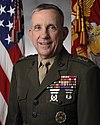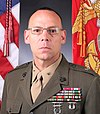Marine Corps Forces Cyberspace Command
| U.S. Marine Corps Forces Cyberspace Command | |
|---|---|
 Emblem of U.S. Marine Corps Forces Cyberspace Command | |
| Active | January 21, 2010 – present |
| Country | |
| Branch | |
| Role | Cyber operations |
| Part of | |
| Garrison/HQ | Fort Meade, Maryland, U.S. |
| Nickname(s) | "MARFORCYBER" |
| Motto(s) | Semper in proelio[1] |
| Website | www |
| Commanders | |
| Commander | MajGen Ryan P. Heritage[2] |
| Sergeant Major | SgtMaj |
| Notable commanders |
|
The U.S. Marine Corps Forces Cyberspace Command (abbreviated as MARFORCYBER[3]) is a functional formation of the United States Marine Corps to protect critical infrastructure from cyberattack.[4] Marine Corps Forces Cyberspace Command is the Marine Corps component to U.S. Cyber Command. It comprises a command element, the Marine Corps Cyber Operations Group, and the Marine Corps Cyber Warfare Group, a total of approximately 800 personnel.[5] MARFORCYBER was established on January 21, 2010 under the command of LtGen George J. Flynn,.[4] As of 7 July 2021, MGen Ryan Heritage is in command.
Overview[]
The Secretary of Defense recognized the significance of the cyberspace domain to national security, and directed the establishment of CYBERCOM as a sub-unified command under STRATCOM. CYBERCOM's primary objective is to integrate the cyberspace operations capabilities of the services and agencies in support of the National Strategy to Secure Cyberspace (NSSC).[6]
In response, the Marine Corps established MARFORCYBER[7] in October 2009 (this was complemented by the standing up of the Fleet Cyber Command, U.S. Army Cyber Command (ARCYBER), and Air Force Cyberspace Command (AFCYBER). MARFORCYBER's mission, in addition to its standard service component responsibilities, is to: plan, coordinate, integrate, synchronize, and direct the Corps' full spectrum of cyberspace operations. This includes Department of Defense (DoD) Information Network (DoDIN)[8] operations, Defensive Cyber Operations (DCO), and planning and, when required, executing Offensive Cyberspace Operations (OCO). These operations support MAGTF, Joint and combined cyberspace requirements that enable freedom of action across all warfighting domains and deny the same to adversarial forces.
Subordinate Units[]
Marine Corps Cyber Operations Group[]
MCCOG[9] directs global Network Operations (NETOPS) and computer network defense of the Marine Corps Enterprise Network (MCEN)[10] and to provide technical leadership in support of Marine and joint forces operating worldwide. The MCCOG is also responsible for intelligence gathering and analysis to develop future capabilities planning in accordance with DCO.
The MCCOG is the Computer Network Defense Service Provider (CNDSP)[11] and serves as the Corps' Global Network Operations and Security Center (GNOSC). The MCCOG provides 24/7 NETOPS C2 through its Operations Center. Under the OPCON (operational command) of MARFORCYBER, the MCCOG executes Information NETOPS and DCO in support of operational requirements in order to enhance freedom of action across all warfighting domains, while denying the efforts of adversaries to degrade or disrupt this advantage through cyberspace.
Key MCCOG tasks include:
- operating and defending the MCEN[10]
- collecting and sharing DoDIN Situational Awareness
- reporting and directing actions that proactively address threats and vulnerabilities
- responding to operational incidents
- providing technical leadership to ensure that our Corps and joint capabilities leverage new technologies to the advantage of the Marine warfighter
Marine Corps Cyber Warfare Group[]
MCCYWG[12] is an administrative headquarters that organizes, trains, equips, provides administrative support, manages readiness of assigned forces, and recommends certification and presentation of Cyber Mission Force (CMF) Teams to U.S. Cyber Command.
Key MCCYWG tasks include:
- Conduct personnel management to organize and assign individuals to work roles and place them in work centers to ensure operational readiness of CMF Teams
- Ensure all personnel are trained in accordance with USCYBERCOM Joint Cyberspace Training and Certification Standards and equipped to perform all duties and tasks outlined in the MARFORCYBER Mission Essential Task List (METL)
- Advise COMMARFORCYBER on force employment considerations
- Provide subject matter expertise for operational planning requirements
List of commanders[]
| No. | Commander | Term | |||
|---|---|---|---|---|---|
| Portrait | Name | Took office | Left office | Term length | |
| 1 | Lieutenant General | 21 January 2010 | 2013 | ~2 years, 346 days | |
| 2 | Major General Vincent R. Stewart | 2013 | 21 January 2015 | ~2 years, 20 days | |
| 3 | Major General Daniel J. O'Donohue | 21 January 2015 | September 2015 | ~223 days | |
| 4 | Major General Loretta Reynolds | September 2015 | 2 July 2018 | ~2 years, 304 days | |
| 5 | Major General Matthew Glavy | 2 July 2018 | 7 July 2021 | 3 years, 5 days | |
| 6 | Major General Ryan P. Heritage | 7 July 2021 | Incumbent | 42 days | |
References[]
- ^ Marine Forces Cyberspace Command [@MARFORCYBER] (2017-02-24). "Marine Forces Cyberspace Command Motto" (Tweet). Retrieved 2018-07-03 – via Twitter.
- ^ Pomerleau, Mark (2021-07-09). "US Marines get new cyber boss". Defense News.
- ^ "Military Department Organization for Cyber Operations: George J. Flynn". Congressional Testimony – via HighBeam Research (subscription required). 23 September 2010. Archived from the original on 28 March 2015. Retrieved 5 February 2013.
- ^ Jump up to: a b McCombs, Alan J. (29 January 2010). "Marines launch into cyberspace mission with new command". army.mil. U.S. Army News Archive. Retrieved 17 January 2016.
- ^ Flynn, George J. (23 September 2010). "Statement of LtGen George J. Flynn, Deputy Commandant for Combat Development and Integration, Before the Subcommittee on Terrorism, Unconventional Threats, and Capabilities of the House Armed Services Committee Concerning Operating In the Digital Domain: Organizing the Military Departments For Cyber Operations". House Armed Services Committee. Retrieved 10 October 2010.
- ^ "The National Strategy to Secure CyberSpace: February 2013" (PDF). U.S. Department of Homeland Security, U.S. CERT. February 2013. Retrieved 24 April 2015.
- ^ "U.S. Marine Corps Forces Cyberspace (MARFORCYBER)". Marine Corps Concepts and Programs. 27 February 2015. Archived from the original on 22 July 2015. Retrieved 24 April 2015.
- ^ Klooster, Larry (14 November 2013). "Operating and Defending the DoD Information Networks (DoDIN): DoDIN Operations and Defensive Cyber Operations (DCO)" (PDF). DISA. Retrieved 24 April 2015.
- ^ McMorries, Col. David W (7 March 2013). "Marine Corps Cyber Operations Group" (PDF). Marine Corps Cyber Operations Group. Retrieved 24 April 2015.
- ^ Jump up to: a b "Marine Corps Enterprise Network (MCEN)" (PDF). HQMC C4. Retrieved 24 April 2015.
- ^ "DISA's Computer Network Defense Service Provider Program (CNDSP)" (PDF). DISA. 7 May 2012. Retrieved 24 April 2015.
- ^ "U.S. Marine Corps Forces Cyberspace (MARFORCYBER)". 18 January 2017. Retrieved 1 March 2017.
See also[]
- Commands of the United States Marine Corps
- United States Cyber Command





